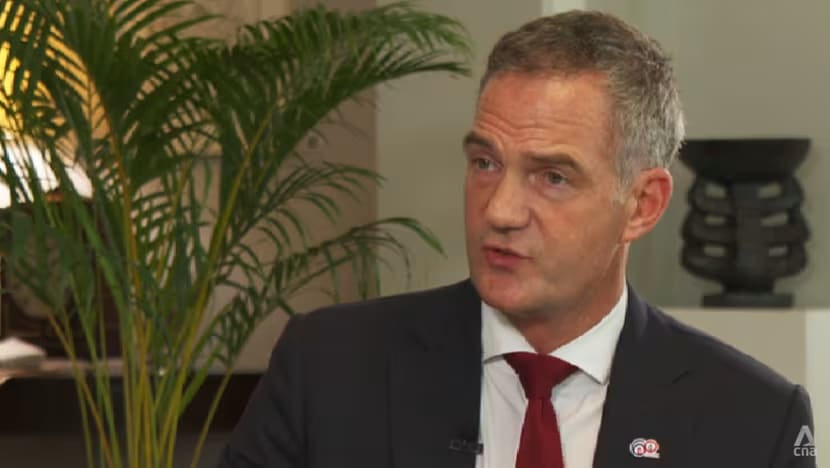Singapore-Britain ties shaped by shared values and complementary strengths: UK state secretary
He says Singapore is a gateway to the Indo Pacific – a region Britain is keen to increase engagement in, especially in the areas of science, technology and trade.

British Secretary of State for Science, Innovation and Technology Peter Kyle speaks to CNA during an interview.

This audio is generated by an AI tool.
SINGAPORE: Singapore and the United Kingdom are deepening their partnership amid global uncertainties, focusing on boosting trade and stepping up defence cooperation, said British Secretary of State Peter Kyle.
His visit to Singapore came as the HMS Prince of Wales docked at the Marina Bay Cruise Centre last week – the British aircraft carrier’s first formal port call in its eight-month Indo-Pacific deployment.
Mr Kyle said the port call represented a symbolic moment for ties between Singapore and Britain, which have been shaped by six decades of shared values and complementary strengths.
“It is a real milestone. (These) 60 years we have communicated, built diplomatic relations, traded together," said the British secretary of state for science, innovation and technology.
“We've worked together to solve lots of challenges (and) create lots of opportunities. We've got a great history of working together diplomatically and economically.”
Mr Kyle added that Singapore is a gateway to the Indo-Pacific – a region Britain is keen to increase engagement in, especially in the areas of science, technology and trade.
“The fast growing sectors of the future – we look at space, AI (artificial intelligence), automation, drone technology. All of these areas are things that Britain … Singapore and the (surrounding) area (are) very good at,” he said.
“We should be working closer together to seize the opportunities that these industries of the future present.”
He also spoke about the common issues both nations are facing, including ageing populations, and said both sides will mutually benefit from knowledge exchange.
“As we look to the future, you can see some of the common threads from our societies. Both Singapore and Britain are facing an ageing population … (which) poses challenges for the way that we govern,” he said.
He praised Singapore’s digital transformation, saying the future lies in cooperation and collaboration “fit for the digital age, not just the manufacturing age that we've been living in for the last 60 years.”
"Singapore has really led the world when it comes to transforming the way that government is delivered to citizens using digital technology. This is something that we in Britain are really trying to learn from," he added.
DEFENCE AND DIPLOMACY
The HMS Prince of Wales is the flagship of a strike group involving ships, aircraft and personnel.
The deployment involves 30 countries - including United States, India, Singapore and Malaysia - through exercises, operations and visits across the Mediterranean, Middle East, and the Indo-Pacific.
The deployment comes at a time of geopolitical tensions and uncertainty. On the British government’s position on the ongoing conflict in the Middle East, Mr Kyle said the priority is to deescalate and return to diplomatic solutions.
“The (British) government is clear that it would be wrong for Iran to develop nuclear weapons. But we are part of a group of nations trying to deescalate the tensions in the region. We are supportive of diplomatic progress,” he said.
“Britain will continue to work with our allies, to use all the diplomatic influence we have, to deescalate and return as swiftly as possible to a long-term diplomatic solution to the many challenges faced in the region.”
Mr Kyle said the strike force is a “friendly mission of … like-minded countries” that “demonstrates the scale of strength that is there in order to deliver the peace and stability that this region needs.”
“Peace has a purpose, and that’s in that environment, we can trade, have friendly diplomatic relations and our people can explore opportunities together. Prosperity grows through having stability,” he added.
He said Britain’s primary interest in the region is to “become a solid economic partner”.
“Most of the Indo-Pacific is fast growing. Britain is a consumer of goods, but also a producer of innovation and trade and goods for which we want to sell into the region,” he said.
“We want to be part of a peaceful diplomacy into the future where (when) there is conflict, we seek to deescalate; where there is opportunity for economic growth, we want to be part of that. I think that the two go hand-in-hand.”











